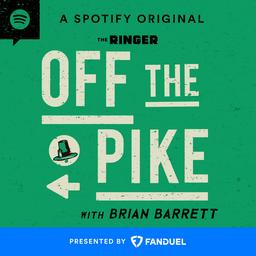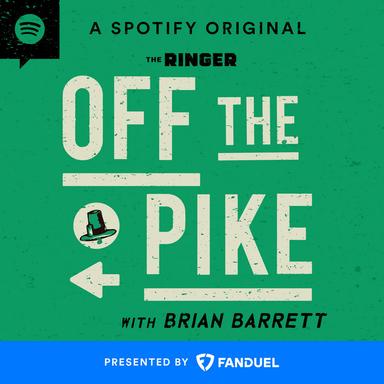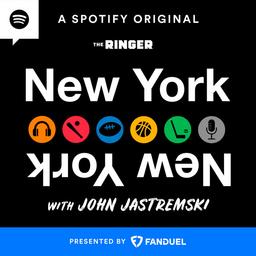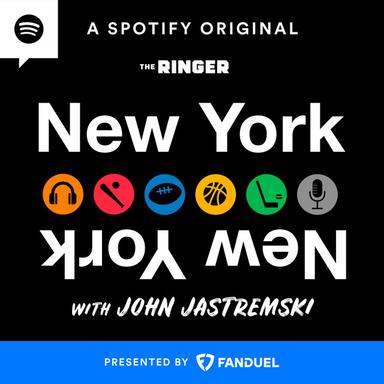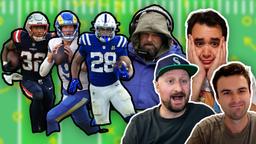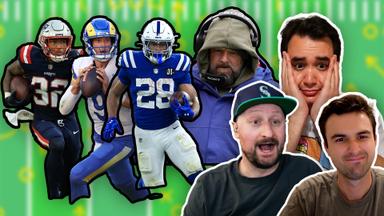Every week this NFL season, we will break down the highs and lows—and everything in between—from the most recent slate of pro football. This week, Mike Vrabel’s game management mastery helped the Patriots make a statement in Tampa, the Texans erased a 19-point Jaguars lead as Trevor Lawrence and the offense stalled out, the Seahawks and Rams each dominated their NFC West contests to set up a Week 11 showdown, the Bills offense was a mess in Miami, Aaron Rodgers played his worst game of the season in prime time, and more. Welcome to Winners and Losers.
Winner: Mike Vrabel’s Game Management
Vrabel is the NFL’s master of stealing time. No coach is better at working the clock to maximize his team’s win probability. There was the time when, in his previous job as the Titans head coach, he got Bill Belichick with his own bit, burning 1:49 off the game clock of a 2020 playoff match by taking false-start and delay-of-game penalties before punting. During the 2020 regular season, Vrabel saved his team at least 40 seconds by taking an intentional penalty for 12 men on the field on a second-and-1, which stopped the clock and saved a down as his Titans were trying to get the ball back for a game-winning drive against Houston.
Now in his first season in New England, he’s still at it. At the end of the first half of Sunday’s 28-23 win, he essentially stole a possession from the Buccaneers by having quarterback Drake Maye take a knee on first-and-goal from the 1, a move that kept the clock running with 1:44 remaining in the second quarter.
This move carried a bit more risk compared to Vrabel’s old clock tricks. The Patriots were stuffed on their two ensuing runs and had to be bailed out on fourth down by Maye and Stefon Diggs, who just barely got his toes down in time to make the touchdown catch in bounds with zeros on the clock.
Vrabel manages games like an annoying Madden player who looks for every edge to eke out a win. I mean that as a compliment. And I respect Vrabel’s refusal to take credit for the high jinks. After the game, when asked whether he told Maye to eat the first-down play to get the clock moving, Vrabel simply said he was proud of his players and excited that the team could “end the half with the football in our hands.” Back in 2020, when asked whether the 12-man penalty was intentional, Vrabel dryly said, “We have to do a better job with penalties.”
Look, I get it. Being the tough football guy is a big part of the Vrabel mystique. Tough football guys don’t waste their time looking for little edges that make the difference in close games. That’s nerd stuff, and Vrabel’s no nerd. (Yes, he is.)
While New England did build a double-digit lead at one point in the fourth quarter, it needed every edge to pull out a closely contested game in Tampa. The Bucs finished the game with a higher success rate than New England (48.5 percent vs. 34.9 percent) and racked up 24 first downs compared to just 16 for the Pats. New England’s explosive plays made up the difference, like Maye’s inch-perfect pass to rookie Kyle Williams, who was filling in for an injured Kayshon Boutte, that went for a 72-yard touchdown.
Rookie running back TreVeyon Henderson, who was in for an injured Rhamondre Stevenson, ran for two long touchdowns, including a 69-yarder that put the game away. While Henderson was closing in on the end zone, he looked to the sideline to check in with Vrabel to make sure it was the right decision to score rather than give himself up to keep the clock running.
Vrabel gave his rookie the go-ahead to cross the goal line, and the Patriots pushed their AFC East–leading record up to 8-2. That also puts them in a three-way tie with the Colts and Broncos for the conference’s best record. And with Maye turning in another solid outing in the win, he’s tied with Matthew Stafford as the betting favorite for MVP. With the Bills dropping a game in Miami, Sunday could not have gone better for Vrabel’s team.
Winner: Dan Campbell the Play Caller
John Morton got benched. Dan Campbell confirmed after the Lions beat the Commanders 44-22 on Sunday that he had taken over play-calling duties, pulling them away from the first-year offensive coordinator. The post-game admission came as a surprise to no one. Campbell sporting his reading glasses to peer at a play sheet and rattling off plays into the headset gave it away to anyone watching at home.
Campbell picked the ideal week to work his way back into play-calling action, which he hasn’t done since pulling a similar move on former Lions offensive coordinator Anthony Lynn back in 2021, Campbell’s first season in Detroit. The Commanders defense was the remedy for what was ailing the offense under Morton’s tutelage: a dodgy run game and an abject failure (in Morton’s words) to get receiver Jameson Williams the ball. The Lions ran for 226 yards against the Commanders, and Williams torched them for 119 yards and a touchdown.
Washington’s defense ranks 24th in EPA allowed against the run and is last against the pass, so the Lions didn’t do anything we haven’t seen other offenses do against the Commanders. They’ve been a “get right” game for most of the teams they’ve played. They haven’t held an opponent under 28 points since early October, so Campbell wasn’t exactly playing on the highest degree of difficulty here. Still, it was a chance to “try something a little different,” Campbell explained after the game.
“Look, I know what I want to do, I know how I want to do it. Now, that being said, this is a collaborative effort, now,” Campbell said. “I was taking input from John Morton the whole time, and the other coaches.”
We’ll need a larger sample size against better competition to properly judge Detroit’s new play-calling setup. The Lions moved within a game of Green Bay (who plays Monday night) for first place in the NFC North, and get Philadelphia next week. The Eagles defense has posted mediocre results this season, but just added a good edge defender in Jaelan Phillips at the trade deadline, and linebacker Nolan Smith returned to practice this week. The Lions also have late-season matchups against the Packers and Rams. That’s three games against the top contenders in the NFC and three talented defenses. Campbell’s play calling will be tested.
Loser: Brian Daboll’s Quarterback Protection Plan
With Brian Daboll’s job security likely tied to the performance of Jaxson Dart, the decision to give the first-round rookie such a large menu of designed quarterback runs is an odd choice. Dart left Sunday’s loss to Chicago after suffering a concussion on his fifth designed carry of the game. It was his 32nd rushing attempt of the season, which ties him with Justin Fields for the league lead among quarterbacks despite Dart starting the year out on the bench.
Before leaving the game, Dart had been playing well in crappy conditions at Soldier Field. Running the ball had been a big part of his success, but Dart had shown enough as a passer against Chicago that Daboll could dial back a bit on the run-game calls, especially since Dart had taken a few big hits early in the game. But he was taking a beating last week as well, and Daboll kept spamming quarterback runs in the second half of a blowout loss to San Francisco. Exposing his young QB to contact has been a season-long issue for Daboll, who can’t help but indulge in what has been a cheat code for the Giants’ run game—even if the downside is clear. Sunday’s game marked the fourth time Dart has been checked for a concussion this year, per ESPN, including the incident in Week 6 that led to a fine from the league after Daboll crashed the blue medical tent to check on his rookie quarterback during an evaluation.
His inability to protect his young QB isn’t Daboll’s only issue this season. Daboll has been a disaster at protecting late leads. After blowing a 20-10 fourth-quarter lead to the Bears on Sunday, the Giants have now lost four double-digit leads this season on the road. On Sunday, it was cowardice that did Daboll in. It’s hard to blame him for taking the points after Russell Wilson did this on the previous snap:
But by passing on the opportunity to extend the lead to 14, the Giants gave the Bears a better shot at winning in regulation, which eventually happened when Caleb Williams capped off Chicago’s comeback with a scramble run for a touchdown with just under two minutes remaining.
You can probably guess how Wilson’s attempt at a game-winning drive went, but Daboll may have saved his team from that inevitable demise with a little more play-calling restraint and situational bravery.
Winner: Week 11’s Rams-Seahawks Heavyweight Fight
In a scheduling quirk, we got a midseason tournament between the four NFC West teams. At least that’s how it worked out after the Rams ran away from the 49ers in a 42-26 win, and the Seahawks beat up on the Cardinals in a 44-22 win that already felt over before the first quarter expired. That sets up a “championship” matchup between 7-2 Seattle and 7-2 Los Angeles that will break the tie at the top of the division standings.
The Rams opened as a slight betting favorite, getting 2.5 points at home, which suggests that the oddsmakers view this as an even match on a neutral field. That feels about right. The Seahawks, who were already ranked no. 1 in total DVOA before pummeling the Cardinals, have the better statistical profile heading into the first of two games between the teams. But the Rams have a battle-tested quarterback in Matthew Stafford, a top-10 run game by both EPA and success rate, and an offense built to win in obvious passing situations. They have an edge over Seattle in all three of those areas.
Both defenses pass the sniff test and should continue to play at an elite level thanks to dominant play in the trenches. The Seahawks sacked Jacoby Brissett five times on Sunday, including two strip-sacks that were scooped up by DeMarcus Lawrence and returned for touchdowns.
The Rams defense had a tougher day against San Francisco. They couldn’t sack Mac Jones, but did force two turnovers and come up with two fourth-down stops. Stafford tossing four touchdowns (and no picks) in another performance that will boost his MVP campaign was enough for Los Angeles to pull away from a banged-up 49ers team that’s starting to fall out of the race.
Next week’s game between San Francisco and Arizona could be an elimination game in the division, and the winner of Los Angeles-Seattle will establish itself as the favorite in the NFC West and possibly the race for homefield advantage in the NFC.
Loser: Trevor Lawrence
The Jaguars blew a 29-10 lead to the Texans and backup QB Davis Mills, as Trevor Lawrence did not complete a single pass in the fourth quarter. After that sort of late-game performance, the Lawrence takes will write themselves this week as we head into another round of debates on whether the former no. 1 pick is any good. Even after Sunday's game, I still believe the answer to that question is “yes.” Lawrence is good, but he never seems to be good enough to overcome the faulty offenses Jacksonville puts him in year after year. The Jaguars have certainly failed Lawrence, but this franchise was promised a transcendent quarterback prospect; and truly elite young passers don’t seem to fail to the extent Lawrence has, no matter how piss-poor their surroundings. So really, the Jags and Lawrence have failed each other.
There’s your Lawrence criticism, so now allow me to mount a defense that absolves him of any blame for Sunday’s debacle. Your honor, my client took only six dropbacks after the Jaguars scored their 29th point with 1:33 remaining in the third quarter. The Texans pressured him on 100 percent of those dropbacks. To be clear: That’s all of them! In the fourth quarter, he was sacked three times, scrambled twice for 24 yards, and had a pass batted down at the line of scrimmage. Lawrence’s only completed pass down the stretch, a 12-yarder to Parker Washington that moved the Jags into Cam Little’s field goal range with under 10 seconds remaining, was wiped out by a penalty for illegal hands to the face by Chuma Edoga. Head coach Liam Coen called three designed runs during Houston’s comeback, which gained only 4 yards.
Coen couldn’t get the Jags’ run game going all day, which meant more pass-rush reps for Houston’s malevolent defensive line. Lawrence was pressured on over 65 percent of his early-down dropbacks in the game. Nine of his 32 dropbacks came on third down, including a third-and-20, a third-and-19, and a third-and-17. It was a total breakdown for the offense. Lawrence may not have closed this one out for Jacksonville, but the team didn’t really give him a fair chance to do it.
Of course, we’re burying the lede by focusing on Lawrence and the offense. Jacksonville’s defense let Davis Mills lead three touchdown drives in the fourth quarter. The Texans backup, who filled in for C.J. Stroud (concussion), made a couple of good throws during the rally, but the Jags had a few chances to nip a comeback attempt in the bud and couldn’t take advantage.
The Texans were able to get their run game going in the second half, which almost never happens for this Houston team. Their 11 designed runs went for 75 yards, and that total doesn’t include a jet sweep for Woody Marks that went for 6 yards and Mills’s 14-yard scramble for the game-winning touchdown.
While there’s plenty of blame to go around for Sunday’s fourth-quarter meltdown, it will be Lawrence and his $275 million contract in the spotlight once again this week. It might be unfair, but that’s what the money’s for.
Loser: Aging Aaron Rodgers
The Steelers lost a barely watchable game to the Chargers on Sunday Night Football, and Aaron Rodgers’s performance was the biggest eyesore. The 41-year-old quarterback looked every bit his age, completing just over 51 percent of his passes for 161 yards, a touchdown, and a pair of interceptions. It was his worst game of the season by a comfortable margin. Rodgers’s dropbacks generated –16.7 EPA and a success rate of just 29.4 percent, both season lows, per TruMedia. After the game, Mike Tomlin was asked how he’d assess his quarterback’s performance, and while he declined to actually answer the question, he made it very clear that he wasn’t pleased with it.
Rodgers was having a decent season relative to expectations before Sunday’s embarrassment, but he’s managed to look well past his prime in every game he’s played—especially when he’s under pressure. According to TruMedia, the Chargers pressured Rodgers on only eight of his 34 dropbacks, but those plays had a devastating effect on the Steelers quarterback. He was sacked on one-third of those dropbacks, lost an average of 1.6 yards per play and –1.53 EPA per dropback. The big blow came on Khalil Mack’s sack in the end zone after the quarterback’s futile attempt to escape.
Rodgers’s inability to move in or out of the pocket has been his biggest obstacle this season, but his waning arm talent is a close second. I’ll give Rodgers a pass on his second interception, which bounced off the hands of Calvin Austin, but the first pick was entirely his own fault.
Rodgers doesn’t have the juice in his arm to make tight-window throws like that with regularity. His fastball has lacked control all season. On the play above, he sails the ball over the head of a bracketed DK Metcalf and into the arms of Chargers safety RJ Mickens. That type of miss has been a common sight on Rodgers’s film this season, and it’s a big reason why the veteran quarterback is avoiding the middle of the field, where in order to be accurate, throws often require an increase in velocity.
This was a winnable game for Pittsburgh. Its pass rush was overwhelming the Chargers offensive line and putting a pounding on Justin Herbert, and the Los Angeles offense had been held to just three points before that ugly Rodgers interception provided Herbert with a short field just before the two-minute warning in the second quarter. Herbert led the Chargers into the end zone with a pass to Ladd McConkey, and that touchdown effectively put the game out of reach for good because of the Steelers’ inability to move the ball.
Rodgers was once a quarterback who could routinely pull his team out of double-digit holes. Not any longer.
Winner: The Ravens’ Playoff Hopes
Pittsburgh’s annual second-half nosedive is ramping up just in time for Baltimore’s inevitable second-half turnaround. Let’s not act like anyone’s shocked the Ravens, who beat Minnesota 27-19 on Sunday, have already pulled within a game of the Steelers for first place in the AFC North. Even when the Ravens were sitting in the basement of the division at 1-5 a few weeks ago, they remained the betting favorite to win it. The only surprise is how quickly the Ravens were able to track the Steelers down.
Baltimore will get its first crack at Pittsburgh in early December—but they could have sole possession of first place well before then. Even if the Steelers can survive their second matchup against the Bengals and Joe Flacco, they host a red-hot Chicago team and have to play Buffalo before their Week 14 trip to the Inner Harbor. The Ravens, meanwhile, get to play the Browns, Jets, and Bengals—who currently have a combined 7-20 record—leading into that game.
Even after a dodgy start, which included a couple big losses to Buffalo, Detroit, and Kansas City, and an injury that sidelined Lamar Jackson for most of October, Baltimore should still be able to cruise to a division crown and a home playoff game. But it still has plenty to show before we can re-approve them for membership in the group of championship contenders. Even Sunday’s road win over the Vikings wasn’t super convincing. Derrick Henry ran for just 75 yards on 20 carries and looks to be on the losing end of a fight with Father Time. I don’t have any Next Gen Stats to back this up, but it looked like he was losing balance half the time he was running the ball on Sunday. Jackson padded Baltimore’s run game stats as usual, but struggled in the dropback game. It was his second-worst game by EPA this season, behind only his performance in the loss to Kansas City, which he left with the hamstring injury that kept him out for a month. His 45-percent success rate against Minnesota was tied for his season-low.
The defense continued its string of good performances but received a lot of help from Vikings QB J.J. McCarthy, who threw two pop-up interceptions to the deep middle and was inaccurate throughout the game. Minnesota hurt its own cause by getting flagged for seven delay-of-game penalties.
But what matters most for the Ravens is that they are back in the thick of the playoff race as they enter the softest part of their schedule. They’ll get two late-season tests against the first-place Packers and Patriots—and those games should give us a better idea of what to expect from Baltimore heading into what should be another postseason appearance.
Loser: Joe Brady’s Job Prospects
It feels like there’s no clear front-runner in the race to become the NFL’s next young offensive coordinator turned head coaching candidate. Bills offensive coordinator Joe Brady was the favorite to be that guy after interviewing for three jobs last offseason. He may still be the favorite, but I’m not sure team owners will be thrilled to hire the guy who made Josh Allen … boring. Brady’s job is to help the Bills win games, not to entertain idiots like me, but we’ve now seen sleepy performances from the offense directly contribute to two losses to inferior opponents. Last month, it was a Monday night loss in Atlanta. On Sunday, the offense was boxed in by a Dolphins defense that’s been the worst in the league at preventing explosive plays in a 30-13 loss. Allen threw for 306 yards but needed 40 attempts to get there, and he was sacked three times. James Cook was held to 53 yards on 13 carries, and Buffalo fell two games behind the Patriots in the AFC East.
Brady’s offense has generally performed at a very high level this season. Even after Sunday’s stinker, it ranks fifth in points per drive and third in total EPA. When the Bills get their run game going, which happens more often than not, they can roll over defenses. But when opponents slow down the run, the onus to create explosive plays falls entirely on Allen. Buffalo doesn’t have a receiver who can take the top off a defense. Keon Coleman is the team’s main deep threat, but a lot of Allen’s deep targets are coming on vertical throws outside the numbers. Here’s the passing map for his attempts over 20 air yards this season, via TruMedia.
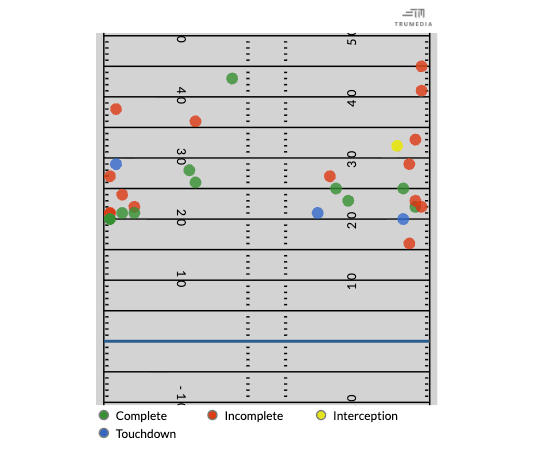
There’s almost nothing down the middle of the field or over the top of the defense. Allen has been efficient when he’s had opportunities to target that area, but the design of Brady’s passing game doesn’t allow the quarterback to attack it very often. Allen did throw a touchdown in that range against the Dolphins on Sunday, but it came on a scramble-drill throw to backup tight end Jackson Hawes.
Buffalo hasn’t had a receiver who can make plays over the top of a defense’s safety shell since Gabriel Davis, who wasn’t good at much else and wasn’t very reliable at the catch point. But with Davis running those big post routes a few years ago, and Allen willing and able to throw them, the Bills could really stretch and stress a secondary. Under Brady, the offense has been built to win in a phone booth but doesn’t threaten defenses outside of it—unless Allen breaks contain and makes a play out of structure or drops one in a bucket on a perimeter throw.
Even before Sunday’s loss to a Dolphins team that looked dead in the water, Buffalo’s failure to bring in a field-stretching receiver at the trade deadline last week felt like a big miss when it should be selling out to win a championship every chance it gets with Allen in his prime. The Seahawks got Rashid Shaheed, who would have filled the void in the deep passing game, for a fourth- and fifth-round pick! What was stopping Buffalo from paying that price?
Unless Josh Palmer, who missed Sunday’s loss, gets healthy and shaves a half second off his 40 time, this problem isn’t going away. To this point, Brady has shown no ability to scheme around it and create easier downfield throws for Allen. While general Brandon Beane also deserves blame for the state of the deep passing game and the holes on the roster, he’s already got his destination job. Brady still needs to earn his.
